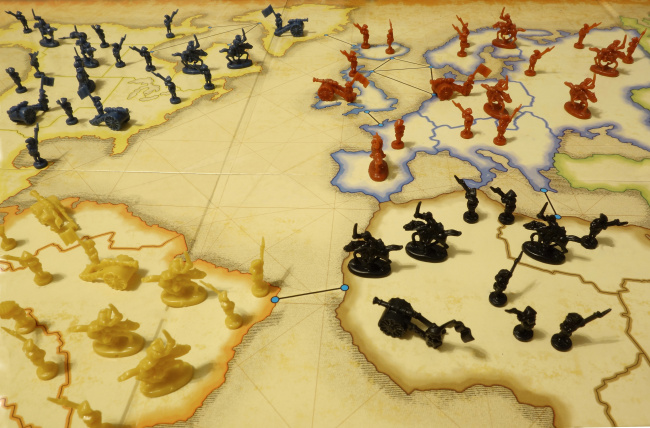War game envisions Korean Peninsula as one of major WWIII theaters
By Jo He-rimPublished : April 26, 2019 - 18:32
If World War III were to break out, the inter-Korean divide would likely be one of the major conflicts fought, and it could also trigger a nuclear war, a recent commentary suggests. That conclusion is based on the outcome of a war game recently conducted by a US Marine Corps school.
In a commentary published on the website War on the Rocks, James Lacey, a professor of strategic studies at the Marine Corps War College in Quantico, Virginia, shared the results of a war game he recently conducted. In his scenario, three major interstate conflicts break out simultaneously.
The war game starts with Russia threatening Poland, having just seized the Baltics and Ukraine, leading NATO to gather its forces on the new eastern front. With the United States distracted, China dares to grab Taiwan. Then, North Korean leader Kim Jong-un attempts to “unify” the Korean Peninsula under his rule.
The three main adversaries -- Russia, China and North Korea -- are pitted against Taiwan and the United States’ Indo-Pacific and European commands. The Indo-Pacific Command is responsible for protecting South Korea.
In a commentary published on the website War on the Rocks, James Lacey, a professor of strategic studies at the Marine Corps War College in Quantico, Virginia, shared the results of a war game he recently conducted. In his scenario, three major interstate conflicts break out simultaneously.
The war game starts with Russia threatening Poland, having just seized the Baltics and Ukraine, leading NATO to gather its forces on the new eastern front. With the United States distracted, China dares to grab Taiwan. Then, North Korean leader Kim Jong-un attempts to “unify” the Korean Peninsula under his rule.
The three main adversaries -- Russia, China and North Korea -- are pitted against Taiwan and the United States’ Indo-Pacific and European commands. The Indo-Pacific Command is responsible for protecting South Korea.

With three major fights going on in the world, South Korea is largely left to defend itself. Though the US sends its 2nd and 25th infantry divisions and two regiments of marines, North Korea strikes before all the South’s forces can be fully deployed to the border from the southern part of South Korea.
With a mission “to strike hard, bypass Seoul and drive deep,” the communist forces break through the Military Demarcation Line and reach Seoul.
But the US Marines and the Army’s 2nd and 25th divisions stop the North Korean forces, and a second defensive line is established along the Bukhan River, a tributary of the Han River that flows through the South’s capital.
With the North Koreans repelled, China’s 79th and 80th armies enter the scene to aid their communist ally, Lacey explained. Still, the progress of the attack is slowed because there are huge numbers of sorties from bases in South Korea, Japan and nearby US bases.
The intense fighting around Seoul leads the US to redeploy the 82nd Airborne Division from its reserve position in Warsaw, Poland, and manages to stymie the Chinese offensive.
To regain the upper hand, North Korea resorts to chemical weapons.
“With no adequate conventional response to chemical strikes, which inflicted tens of thousands of military and civilian casualties, the INDOPACOM commander requested nuclear release authority,” Lacey wrote. INDOPACOM refers to the US Indo-Pacific Command.
In the commentary, Lacey also described the fierce fighting occurring at the same time in other regions of the world. Similar scenarios occur in these battles, and US commanders again request authorization to use nuclear weapons.
While the two-day game was designed for educational purposes, not for serious analytical work, Lacey said it held several lessons that the Joint Chiefs of Staff should consider.
“Neither America nor its allies had any adequate response to the use of chemical weapons by the enemy, short of requesting nuclear release,” Lacey said. “It is worth noting that every battle headed rapidly toward total war, as both sides’ commanders sought to escape restraints on what weapons they could employ within a theater.”
Based on the war game, he also explained that the allies must sustain battle for about 10 days before the North Korean logistics system collapsed, and that the fighting would remain brutal even after it collapsed.
Kim Dae-young, an analyst at Korea Research Institute for National Strategy here, drew the inference that the denuclearization issue on the Korean Peninsula is not just a matter of inter-Korean relations.
“The war game depicts one of the possibilities of how the war on the Korean Peninsula -- which would be a second Korean War -- might unfold,” Kim told The Korea Herald.
“While it is only making a supposition, if a second Korean War were to break out, it would most likely lead to World War III, so it is not just simply an inter-Korean issue.”
Kim said it was shocking to see the weapons of mass destruction, such as nuclear and chemical weapons, included in the war game, and to see the Chinese forces entering the war to fight on South Korean soil.
“It means South Korea should take a leading role and be more active in establishing its own military strategies, to protect itself from outside threats other than North Korea,” Kim added.
The Marine Corps War College provides joint professional military education to selected US military officers, civilian government officials and international military officers.
By Jo He-rim (herim@heraldcorp.com)








![[Kim Seong-kon] Democracy and the future of South Korea](http://res.heraldm.com/phpwas/restmb_idxmake.php?idx=644&simg=/content/image/2024/04/16/20240416050802_0.jpg&u=)








![[KH Explains] Hyundai's full hybrid edge to pay off amid slow transition to pure EVs](http://res.heraldm.com/phpwas/restmb_idxmake.php?idx=652&simg=/content/image/2024/04/18/20240418050645_0.jpg&u=20240418181020)

![[Today’s K-pop] Zico drops snippet of collaboration with Jennie](http://res.heraldm.com/phpwas/restmb_idxmake.php?idx=642&simg=/content/image/2024/04/18/20240418050702_0.jpg&u=)